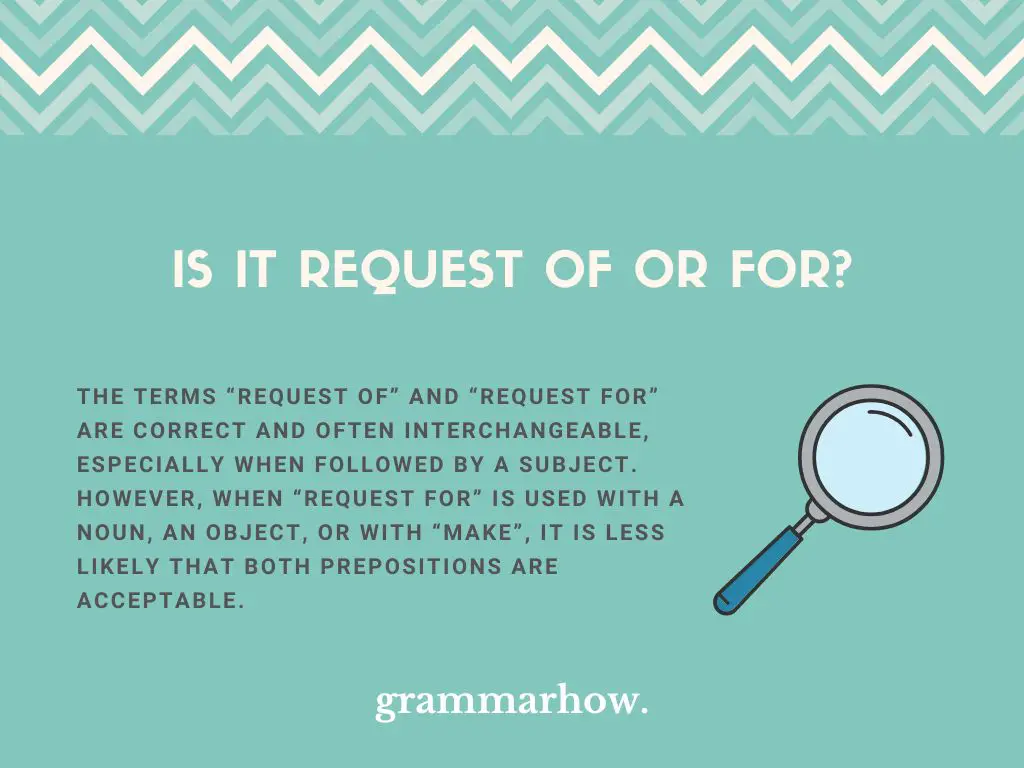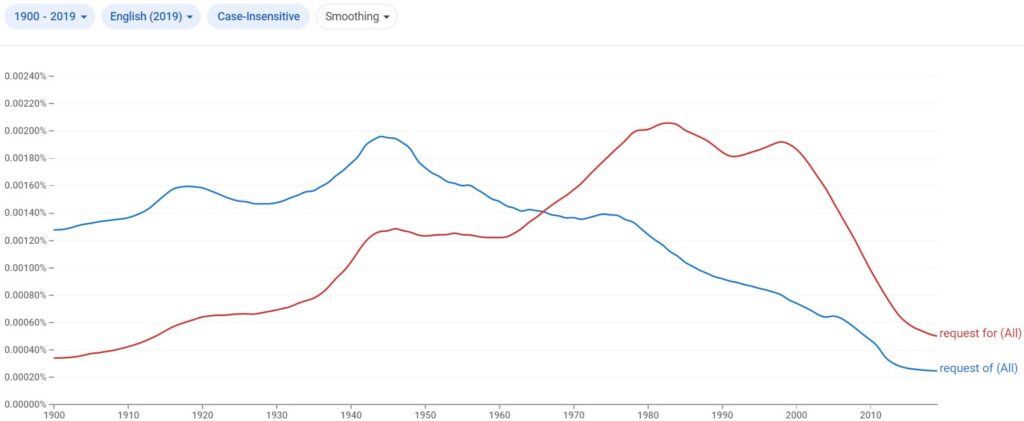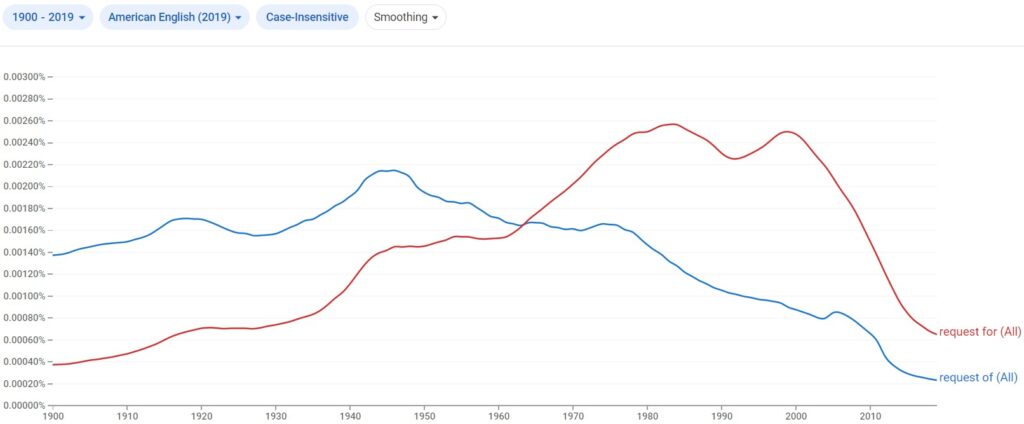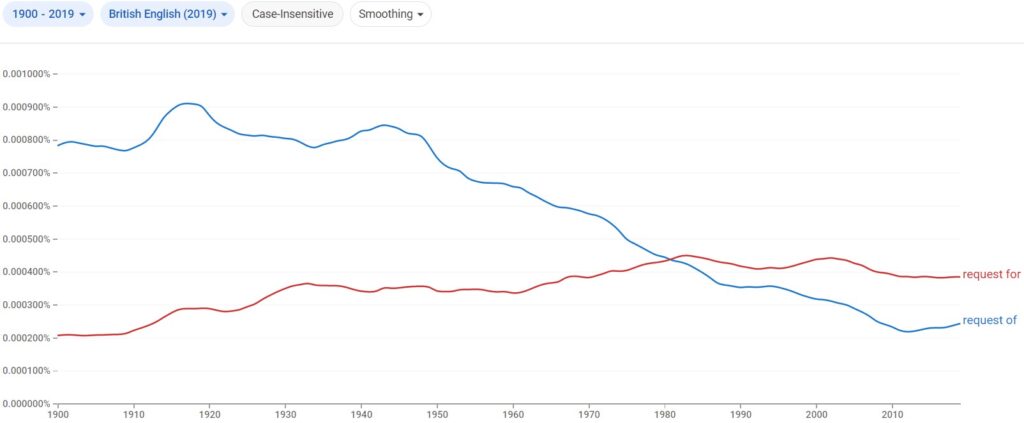The difference in the prepositions “of” and “for” after the word “request” can be challenging to grasp, especially if English is not your first language. This page examines the differences and similarities between “request of” and “request for” and provides contextual examples.
Is It Request Of or For?
The terms “request of” and “request for” are correct and often interchangeable, especially when followed by a subject. However, when “request for” is used with a noun, an object, or with “make”, it is less likely that both prepositions are acceptable.

According to the Macmillan Dictionary, “request” means to “ask someone to do something” or “ask for something.”
1. As a verb – When using “request” as a verb – Changing the preposition can dramatically change the meaning. Please note that requesting “something of someone” is quite a formal structure but is nonetheless correct.
When the subject appears after the “request for/of”, they can often both be used. However, when an object appears after the “request for/of”, generally only “request for” can be used.
As shown in these examples:
- He requested for the student to be brought to his office. (He asked someone else to tell the student)
- He requested of the student that he improve his behaviour. – (He told the student to improve)
- The man requested for new towels to be brought to the room.
- The man requested of new towels to be brought to the room. – INCORRECT
2. As a noun – When using “request” as a noun, it is often used with the verb “make.” As with the verb, it functions similarly when an object follows the “request.”
As shown in the examples below:
- She made a request for/of us to buy two bottles of wine for her dressing room.
- I would like to make a request for a refund on the dress I bought.
- She made a request for/of us to arrive on time
- The committee made a request for the report to be completed.
Request Of
The term “request of” can be used in several different ways and is sometimes interchangeable with “request for”, especially when it is combined with the verb “make” and is an “order” of some kind or telling someone else what you want them to do.
When the subject appears after the “request”, you can often use both prepositions.
For example:
- I want to make a request of/for you to stop arriving home so late.
- She made a request of/for us all to work together as a team.
Another common phrase you will come across is “At the request of”, which means the request belongs to someone else. When referring to somebody else’s “request”, varying the pronoun changes the sentence’s meaning and “of” can mean the “request” belongs to them, while “for” means the request is designated “for” them.
For example:
- At the request of the directors, I am afraid you have been made redundant.
- At the request of your mother, we are getting out of the house for a few hours.
- It is the request of our customers that we close the shop later.
- It is the request for our customers that we close the shop later. – INCORRECT
Request For
The term “request for” is often used with the verb “make” and is basically used to specify “what” somebody is requesting or “who” a request is for. It is often interchangeable with “request of.”
The following examples show the different uses of “request for”:
- We have the request for/of a woman who wants an appointment at 6 pm.
- I received a request for/of a man asking for a refund.
- He made a request for a taxi to collect him outside the airport.
- I am writing to make a request for assistance.
- The public’s request for extra housing fell on deaf ears.
Which Is Used the Most?
The Google Ngram Viewer shows that from 1900 to 1960, the term “request of” was considerably more frequent than “request for.”

However, since 1960 “request for” proliferated and became more common before dropping off slightly in the 2000s. Nowadays, the terms “request of” and “request for” are used with the same frequency worldwide.
The graph for American English shows that the spike in usage of “request for” from the 1970s to 2000 was mainly down to growth in the US rather than in the UK, where the trends have remained pretty stable.


Final Thoughts
The terms “request for” and “request of” are tricky because sometimes there is no change in meaning; other times there is a change, and sometimes only one is possible. Generally, if a subject follows “request”, both are acceptable, although this is not a concrete rule.

Martin holds a Master’s degree in Finance and International Business. He has six years of experience in professional communication with clients, executives, and colleagues. Furthermore, he has teaching experience from Aarhus University. Martin has been featured as an expert in communication and teaching on Forbes and Shopify. Read more about Martin here.
